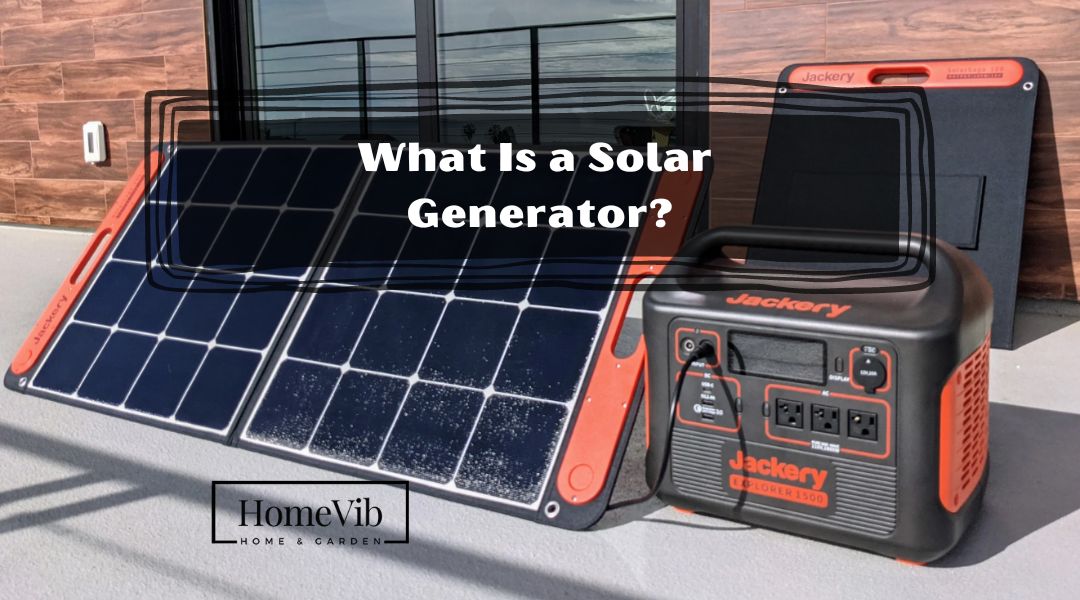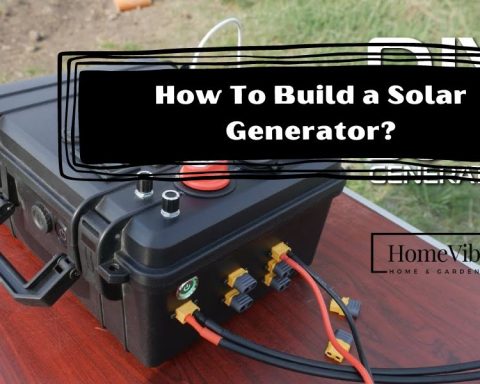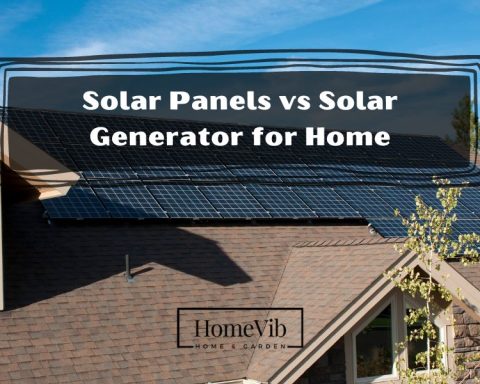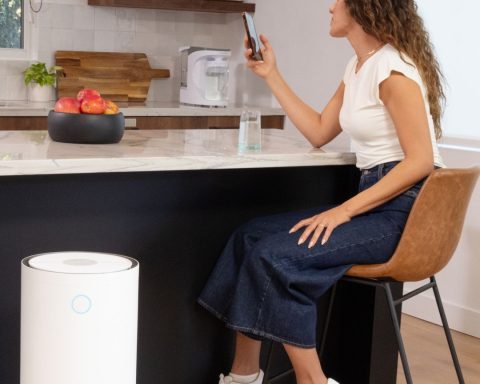The sun is the most accessible and sustainable resource in our solar system. Solar power has revolutionized energy production in recent years, and renewable energy is quickly becoming the way of the future. But what if you couldn’t use your control at night or when there is no electricity?
Current solar technology would leave you stranded and helpless in these conditions. But thankfully, there is a solution to this problem called a solar generator. This equipment allows people to use solar power without relying entirely on an electrical grid.
This guide will explain a solar generator and how it can help you save money and improve your quality of life.
A solar generator is a device that transfigures solar energy into an alternate, renewable power source. They are great when you don’t have access to electricity or want a backup energy source. Solar generators can be used for power outages, camping, and outdoor events with limited access to an electrical outlet.
What Is a Solar Generator, And How Does It Work?
A solar power generator is any system that uses solar energy. Most people, however, understand the term “solar generator” to refer to a portable power station that generates electricity using solar panels rather than fossil fuels.
A portable solar generator captures the sun’s energy with solar panels and stores it in a battery. Most solar generators are used for RV camping, watercraft, and as a backup power source in a power loss on the grid.
We shall examine each component separately to understand further how solar generators work.
Solar Panels

Portable solar panels are compact solar panels that may be taken anywhere and are straightforward to install. They convert sunlight into energy or heat in the same way that a standard solar panel does. They are made up of photovoltaic cells. Each panel is divided into smaller cells composed of thin silicon layers. They differ in size, but even the most prominent portable solar panel can fit inside a car.
Solar Battery
A solar generator must store the energy it captures from the sun to be used later. The battery serves as a storage unit. Since around 2016, lithium-ion batteries have been employed in many solar generators. However, less efficient lead-acid batteries are less expensive and plentiful than lithium-ion technology.
Solar Charge Controller
A solar charge controller prevents overcharging of the battery by limiting the voltage and current flowing from the solar panel to the battery. It manages the amperage and voltage given to the loads, and any extra power is delivered to the battery system to ensure that the batteries do not overcharge. For example, when there is no sunshine in the evening, battery power is used to power the load.
Solar Inverter
A solar inverter turns the energy produced by solar panels into usable electricity used in your house or office. It converts the variable direct current or ‘DC’ output from your solar panels into alternating current or ‘AC’ production. Because your home’s appliances run on alternating current (AC), the solar inverter must convert the DC output gathered by your solar panels.
So How Does It Work?
Solar panels cannot function as generators on their own; the electricity they produce must be stored somewhere. When you expose your solar panels to sunlight, they have direct current (DC) electricity. A charge controller modulates the power output from your solar panels so that the DC electricity may be stored conveniently in the battery storage system.
When you wish to utilize the electricity you’ve saved later, it goes via an inverter, which converts direct current (DC) electricity to transfiguring current (AC) electricity, which most appliances use. Then, you can directly plug your gadgets into the generator and use the newly generated power.
What Is a Solar Generator Good For?

Solar generators provide the same amount of power, if not more. As a result, they can be used to power simple equipment ranging from light bulbs to more extensive and power-intensive appliances such as cooling systems.
Power Large Appliances
Air conditioners, washing machines, refrigerators, and other large equipment quickly consume a lot of electricity. Without a doubt, this equipment would have a high annual cost. Although you may need to make a significant initial expenditure to obtain powerful solar panels to power your heavy appliances, you will no longer have to pay for electricity.
Tools For Power Building
Solar systems can also be used to power drilling instruments. Drilling equipment will come in handy at home and during outdoor activities such as camping and trekking. On the other hand, building tools have become more complex and consume more electricity than usual.
Electronic Devices With High Power
Today, smart devices are as essential as food. Nobody can go a day or two without checking the internet for emails, texts, and other connected information. Given their importance, most solar systems are designed to power them at the most basic level. Then, connect them to the solar system using an AC converter or a 12V DC.
Power Light
Most solar generators include lights that can navigate campsites or within the house. Furthermore, most have handles or lanyards that allow you to carry them around as needed. While the lights on the generators can function, brilliant lamps are preferable because they are movable and extremely bright.
Additional Benefits of a Solar Generator
Solar generators are an investment that will pay off in the long run by saving money on your utility bills and providing emergency backup power when needed.
Here are some additional benefits of Solar Generators you can consider:
Low Maintenance Power Source
Who wants to deal with the upkeep of a gasoline generator? With a solar generator, you never have to change spark plugs, air filters, or fuel switches.
Fuel At No Cost
Because the energy comes from the sun rather than expensive traditional fuel, the cost of charging can be free. So start installing solar panels and enjoy free electricity.
A Perfect Emergency Device
Solar generators are perfect for emergencies since you need to turn on the generator and connect your equipment, and you’re ready to go.
Easy To Move, Portable
Solar generators are typically lighter than regular generators. In addition, some of them have handles that improve portability and make transportation easier for you. Perfect for outdoor camping, hiking, and emergencies.
Versatile
The electricity produced by your solar generator is identical to ordinary electricity. Therefore, you can utilize the generator to power any of your appliances, regardless of size.
Energy For Free
All you have to pay for solar energy is the initial purchase price. Because sunshine is free, and you no longer need to buy gasoline.
Pollution Is Reduced
Finally, solar generators create clean energy with no noise or carbon emissions, making them extremely environmentally friendly.
No Noise
There are no signs of moving parts in solar generators. As a result, they operate at near-silent noise levels. The last thing you want is to be able to work or relax while hearing the constant hum of a generator.
What Is the Difference Between a Solar Generator And a Battery?
A solar generator has a battery and requires a minimal setup to power electronics/appliances. However, external components are necessary for a battery to provide electricity to whatever needs to be powered.
As a result, solar generators are typically more expensive than batteries.
The distinction between solar generators and batteries used with solar panels is that a solar generator has all the components required for self-sustaining power. A charge controller is an intermediate between the two for batteries to charge appropriately from solar panels.
Batteries must be charged and discharged correctly to function properly, and solar generators meet this criterion since they each have a Battery Management System (BMS).
What is a Battery Management System (BMS)?
A Battery Management System (BMS) monitors and manages internal operational factors such as temperature, voltage, and current during battery charging and discharging. In addition, to improve safety and performance, the BMS estimates the battery’s SoC (State of Charge) and SoH (State of Health).
What Is the Difference Between a Solar Generator And an Inverter?

Solar generators are machines that transform mechanical energy into electrical energy. The converted energy powers homes and all of their appliances. It serves as the primary power source and is an alternative to electricity.
In contrast, inverters are electronic devices that convert direct current to alternating current. AC is used to power appliances. Inverters can be linked to power lines, solar panels, and generators.
Do You Need An Inverter With A Solar Generator?
The answer is yes. An inverter may be helpful if you want your solar generator to last longer in the event of a power outage. When activated, an inverter draws power from the generator rather than the solar battery. When there is no sun, you can utilize the solar battery to power your load at night.
Do Solar Generators Work at Night?
No, they don’t. Solar panels, as previously noted, require light — preferably sunlight — to generate energy. Although they can cause some energy from other light sources, such as street lights and even the moon, the output is relatively low. As a result, solar panels sleep at night, so they stop producing electricity.
At night, solar panels produce no electricity. However, they fabricate more power when the sun is shining throughout the day. Solar users use solar battery banks or net metering to balance and keep the power on after the sun goes down.
What Is The Purpose Of Solar Battery Bank?
A battery bank is a collection of batteries connected in parallel and series to form an energy storage bank that stores solar energy from a solar panel and provides electricity to loads via a DC-AC inverter. A battery bank is essential for a solar power system as an energy storage device.
Do Solar Generators Make Noise?

During operation, a solar generator makes no noise. They are not the same as traditional fuel-powered machines, which have several moving parts and can make unsettling noises.
The generator’s only noise you should expect to hear is from its inverter. However, even if there is noise, it will be pretty low and easily overlooked by most people.
Because there are no moving parts, solar generator parts breaking is low. Compared to a gas generator, this significantly minimizes the maintenance necessary for a solar generator.
Does Solar Energy Produce Noise Pollution?
Solar energy generates electricity softly, allowing it to be used in residential settings without causing noise pollution. Solar energy is abundant and limitless. No air or water pollution is produced when solar panels generate energy. It does not necessitate the transportation of fuels or the disposal of waste products. Many rooftops can be outfitted with solar panels.
Are Solar Generators Worth the Money?

Yes, solar generators are worth the money.
Solar generators allow you to take your power on a camping trip or an emergency. They’re also a great way to reduce your carbon footprint and save money.
This equipment runs off solar panels, which collect energy from the sun and convert it into electricity. The electricity is stowed in batteries for later use so that you can charge up your devices. Solar generators are beneficial for people who live in areas where electricity is unreliable or difficult to access.
They’re also relatively easy to install on your home, so you can use them whenever necessary. This means that even if there is no sun shining outside when your power goes out, you’ll still have access to electricity through your solar system!
How Much Do Solar Generators Cost?
Solar generators with a smaller capacity than most models may typically be purchased for as little as $100 to $500. Small solar generators can generate up to 5 watts and ten amp-hours.
On the other hand, higher-end solar generators can range from $2,000 to $4,000. These large solar generators provide enough backup power for the house in an emergency.
How Long Do Solar Generators Last?
Solar-powered generators typically last between 25 and 35 years, depending on the brand and quality. It is an investment but will pay off in the long run. Furthermore, many solar generators come with warranties, so you can get them fixed if something goes wrong.
Solar Panels: 20-25 years
The good news is that while the solar panels may no longer be capable of powering your generator, you can still use them to power minor appliances such as lights and fans, ensuring they do not go to waste.
Battery: 5-10 Years
The average lithium battery would have a lifespan of 1500-3000 charge cycles, or about seven years if you utilized the generator daily.
Charge Controller: 15-20 Years
The charge controller is a generic component that regulates the flow of electricity from the solar panel to the battery. This critical component prevents the battery from overcharging and increases its longevity.
Inverter: 10-15 Years
Inverters transform the DC electricity from the batteries into AC that your appliances can utilize. However, their lifespan will vary because inverters are fragile and prone to damage from power surges.
Are Solar Generators Safe?
Solar-powered generators, unlike fuel-powered generators, do not create environmentally toxic pollutants. As a result, they are the most secure solution for use.
Solar energy systems and power plants emit no air pollution or greenhouse gases when running. However, when solar energy replaces or lessens the usage of other energy sources with higher environmental impacts, it can positively and indirectly influence the environment.
How Long Will a 1000-watt Solar Generator Run?
Although 1000 watts will not cover the annual usage of a large home, 1000 watts (also known as 1 kilowatt) of solar can supply plenty of helpful electricity for cabins, workshops, RVs, or vehicles.
Bear in mind that a solar panel with a capacity of 1000 watts does not exist. You’ll need to connect a few panels to get 1kW of solar electricity.
Most 1000-watt solar panel systems are five 200-watt solar panels or ten 100-watt solar panels. Simple math shows that summing the wattage of panels in each system results in 1000 watts or 1 kilowatt.
Once a 1000-watt solar generator is achieved, it is powerful enough to power a television, a small heater, a blender, and even a full-size refrigerator. It can even power a single-pot coffee machine and a low-wattage electric grill.








